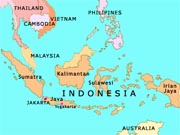Indonesian president defends fuel price hikes amid protests
 Jakarta - Indonesian President Susilo Bambang Yudhoyono defended his unpopular move to raise domestic fuel prices Monday, as anti-government rallies continued in the world's fourth most-populous country.
Jakarta - Indonesian President Susilo Bambang Yudhoyono defended his unpopular move to raise domestic fuel prices Monday, as anti-government rallies continued in the world's fourth most-populous country.
Yudhoyono told a forum of regional investors that Friday's decision to reduce oil subsidies and raise fuel prices an average of 28.7 per cent was necessary to avoid an economic meltdown.
"This difficult decision was the best, necessary and most responsible solution to save our national economy from crumbling and protect our people from harm," Yudhoyono said. "The alternative would be a possible financial and economic crash similar to that of 1997 and the real loser here would be our own people."
In the capital Jakarta, thousands of students and industry workers marched to outside the presidential palace to protest the third such increase under Yudhoyono's administration.
"The fuel price hikes will further trigger prices of all basic commodities to soar. We are demanding the government reduce fuel prices," said Edi Rusmadi, chairman of the All-Indonesian Workers Union.
Jakarta city police deployed more than 1,000 officers backed by water cannons to contain the protests, witnesses said. Local media reported that similar demonstrations were held in several cities and towns across the country on Monday.
Public transportation operators and drivers in many cities also protested the decision by shutting down bus services Monday.
In a bid to soften the blow of fuel price hikes on the poor, the government handed out up to equivalent of 1.5 billion dollars in cash to about 19 million impoverished families.
Indonesia is Asia's only member of the Organisation of Petroleum Exporting Countries, but has become a net crude oil importer due to sharply declining output.
Earlier this month, Yudhoyono said the government might quit its membership in OPEC because the country's interests have now come into conflict with the cartel's policies. (dpa)